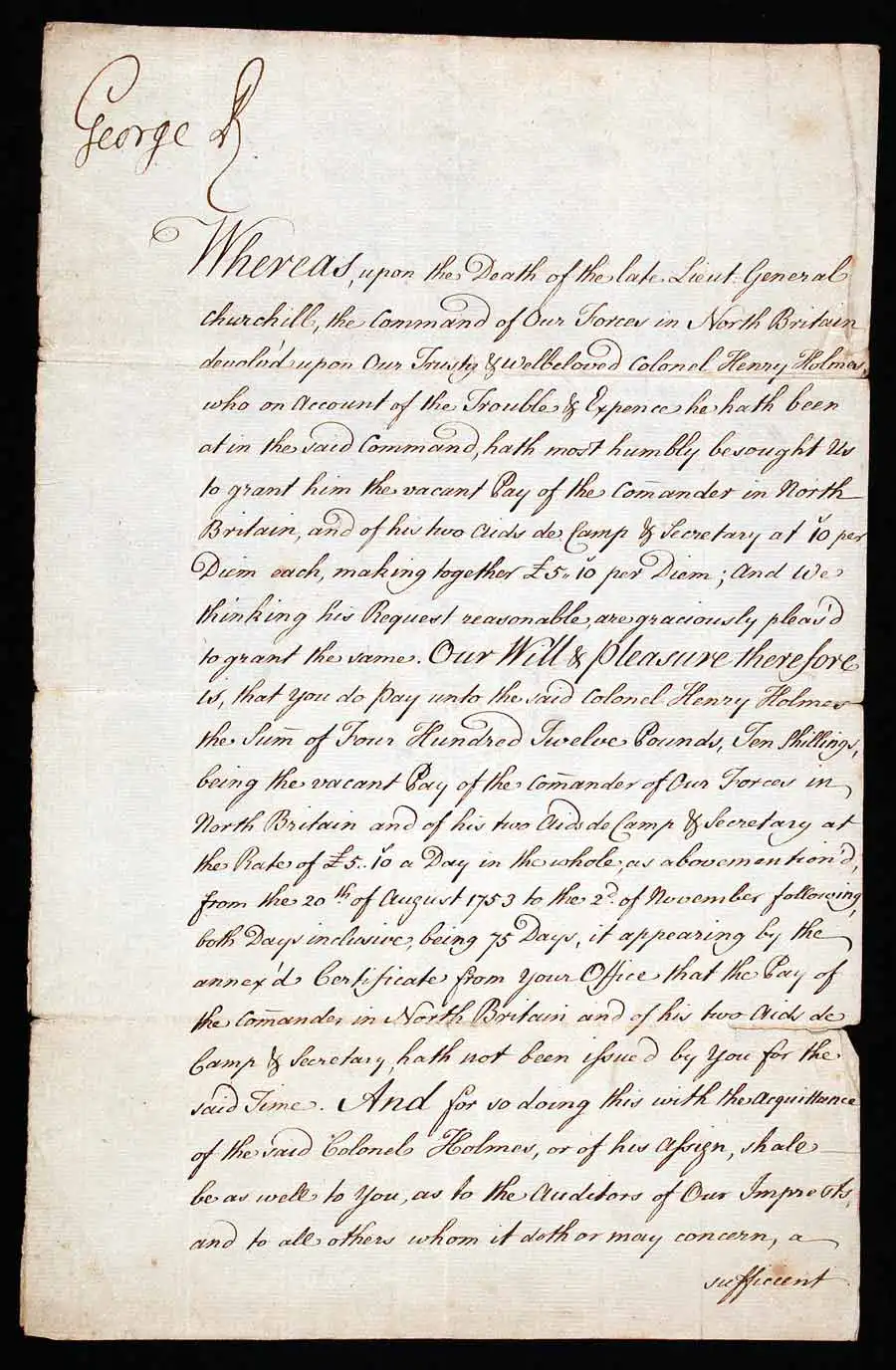Case 3
- George II
![Warrant for swearing in George Drummond as Secretary to the Order of the Thistle. Signed by George II (1683–1760), issued by John Newcaills [?] to the Knights of the Order of the Thistle, 2 March 1736/7.](https://www.reedgallery.co.nz/__data/assets/image/0003/263739/case3-item1.webp)
Warrant for swearing in George Drummond as Secretary to the Order of the Thistle. Signed by George II (1683–1760), issued by John Newcaills [?] to the Knights of the Order of the Thistle, 2 March 1736/7.
George I was struck by a cerebral haemorrhage during one of his frequent visits to his native Germany, where he died on 22 June 1727. His son, George Augustus, acceded to the throne and was crowned George II on 11 October 1727. His rule saw a great increase in prosperity both at home and abroad, the brutal crushing of the 1745 Jacobite rebellion at Culloden (under his son, the Duke of Cumberland), and victories over the French that led to the conquest of Canada and the destruction of French power in the East Indies. These military successes gained the House of Hanover a measure of popularity, and it was during the reign of George II that the earliest version of what became Britain’s national anthem, ‘God Save Great George Our King’, was first sung.
This royal warrant, which bears the large signature of George II at the top left, appointed George Drummond (1687–1766), Lord Provost of Edinburgh, as Secretary to the Order of the Thistle, a chivalric order associated with Scotland founded in 1687. One of the founder knights was John Drummond, 1st Earl and titular 1st Duke of Melfort (1649–1714).
![Warrant for swearing in George Drummond as Secretary to the Order of the Thistle. Signed by George II (1683–1760), issued by John Newcaills [?] to the Knights of the Order of the Thistle, 2 March 1736/7.](https://www.reedgallery.co.nz/__data/assets/image/0003/263739/case3-item1.webp)
Warrant for swearing in George Drummond as Secretary to the Order of the Thistle. Signed by George II (1683–1760), issued by John Newcaills [?] to the Knights of the Order of the Thistle, 2 March 1736/7.
Open image in new window

Warrant granting Henry Holmes the vacant pay of the late Lieutenant General, Charles Churchill (1679–1745). Signed by George II and issued by Henry Fox, 1st Baron Holland (1705–1774) to William Pitt, 1st Earl of Chatham (1708–1778), 16 March 1754.
This royal warrant granted Colonel Henry Holmes (1703–1764) the vacant pay and of Lieutenant-General Charles Churchill (1679–1745), as well as the late officer’s command of the army in northern Britain. Holmes had won the favour of George II in 1746 by declaring his immediate readiness to the King while his fellow officers asked for a few weeks leave of absence before embarking on a military expedition. He remained a favourite of George II, who promoted Holmes to the rank of Major-General in 1756 and Lieutenant-General three years later.
The recipient of the warrant was William Pitt the Elder, the Whig statesman who led Britain during the Seven Years’ War, and advocated for British expansionism and colonialism. The sender, Henry Fox, was Secretary at War at the time and Pitt’s main political rival.

Warrant granting Henry Holmes the vacant pay of the late Lieutenant General, Charles Churchill (1679–1745). Signed by George II and issued by Henry Fox, 1st Baron Holland (1705–1774) to William Pitt, 1st Earl of Chatham (1708–1778), 16 March 1754.
Open image in new window
![Warrant for swearing in George Drummond as Secretary to the Order of the Thistle. Signed by George II (1683–1760), issued by John Newcaills [?] to the Knights of the Order of the Thistle, 2 March 1736/7.](https://www.reedgallery.co.nz/__data/assets/image/0003/263739/case3-item1.webp)
